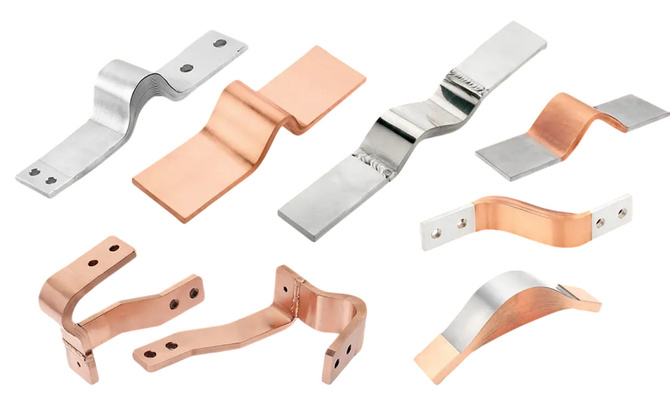Druseidt - Flexible connections made out of copper- and aluminium foils
- Druseidt - flexible connections made out of copper- and aluminium foils
Flexible connections made out of copper and aluminium foils from Druseidt are modern solutions for demanding industrial installations where high conductivity and flexibility of connections are key. These connectors consist of multiple layers of copper (HCP) or aluminium foil, whose contact areas are compacted by pressure welding, gas shielded welding, electron beam welding or riveting. This gives them a constant cross-section along their entire length and high flexibility. They are manufactured in a wide range of dimensions, also to order, with coated contact surfaces (tin plating, silver plating) or in a fully coated version. Druseidt flexible connectors are used, among other things, as connections between transformers, generators, rectifiers and switchgear, as well as elements compensating for movement and thermal expansion in devices, machines and welding systems.
Range of Druseidt flexible connections made out of copper- and aluminium foils
Flexible copper and aluminium foil connectors These are flexible connectors consisting of layered copper or aluminium foil packages. The contact areas are compacted by special welding or riveting processes, ensuring a constant conductor cross-section over the entire length of the connector.
- Material: HCP copper foils in accordance with DIN 13599 with a thickness of 0.1 mm or 0.3 mm, or pure aluminium foils with a thickness of 0.3 mm. Copper foils with thicknesses from 0.02 mm to 0.5 mm are also available on request.
- Design: The central expansion section of the connector remains flexible. It is possible to weld bent current rails, clamps or other solid copper elements to the flexible foil packages.
- Flexibility and compensation: They compensate for expansion caused by temperature increases and movements caused by equipment vibrations. They can accommodate movements inside machine parts, contactors or welding guns.
- Adaptation to requirements: Contact areas can be drilled, milled or bent. The widths of the contact areas are selected so that several connectors can be installed next to each other at a distance of 2 mm (e.g. for generator connections). Drilling according to standards (e.g. DIN 43673, DIN 46206) or customer drawings is available on request.
- Contact surface: On request, coated contact areas (e.g. tin-plated or silver-plated) can be supplied. Complete tin-plating or silver-plating after production is also possible.
- Current carrying capacity: The minimum current carrying capacity complies with the values for solid busbars (according to DIN 43671, DIN 46276 for copper; DIN 43670, DIN 46276 for aluminium).
Flexible transformer connections with expansion joint These are flexible connections made of copper, with expansion joints and welded clamping elements for round connections.
- Design: They can be supplied with a clamp on one side and a flat connection on the other (for busbar systems) or with clamps on both sides (for pipe systems). Both the upper and lower parts of the clamp can be designed with an expansion part or only the upper part.
- Fit: Individually designed for transformers. We manufacture them according to drawings or customer requirements.
- Material and finish: Made of copper, with a foil thickness of 0.02 mm to 0.5 mm. They can be supplied with tinned or silver-plated contact areas, as well as in a fully tinned or silver-plated version.
PVC-insulated supple bars These are insulated, flat electrical conductors consisting of multiple layers of uncoated or tinned Cu-ETP (99.9% copper) copper strips. The insulation is made of flexible, high-quality, self-extinguishing and lead-free vinyl.
- Flexibility: They can be installed in hard-to-reach places and small spaces. The flexibility of vinyl allows the bars to be deformed even with larger cross-sections. It is possible to bend and twist them to change the connection level in a minimum space.
- Electrical advantages: Thanks to their large surface area and favourable thermal radiation properties, they carry higher current loads than solid busbars of the same cross-section. This allows the use of smaller components.
- Cost savings: They allow for individual component adjustment, cross-section reduction and shorter installation times, making them a cost-effective product.
- Installation: Simple installation by drilling, punching or clamping from below. They must be bent before cutting/drilling/punching and clamped firmly during these operations to prevent displacement of the copper strips.
- Delivery: Standard lengths of 2 m, other lengths (e.g. 3 m) on request. Also available with halogen-free insulation on request.
Technologies and Services
Production Processes for Contact Areas
- Press welding: A special resistance welding process used for copper joints. It enables compact and safe welding of entire surfaces without the use of welding additives. It creates an excellent molecular structure of contact areas through grain diffusion processes. It ensures excellent electrical conductivity.
- Inert gas welding: Used for aluminium joints, foil joints with different contact area widths or larger, angular contact areas. Enables the welding of solid contact elements or clamping devices (for pipes, round bolts) to flexible parts. Protects molten metal from oxidation.
Finished machined flexible insulated busbars / drawing components Druseidt offers the production of bent, perforated and drilled laminated insulated busbars according to customer requirements or drawings. They are an extremely economical and space-saving way of making power connections in power transmission systems, especially in compact switchgear designs. Individual parts, smaller quantities and series parts with continuous deliveries can be produced at short notice. The company has various bending technologies at its disposal.
Typical applications
- Flexible copper and aluminium foil connectors:
- Connections between transformers, generators, rectifiers or switchgear and prefabricated networks.
- As flexible components for movements inside machine parts, contactors or welding guns.
- In the area of generator connections.
- Flexible transformer connections with expansion parts:
- For connections between transformers and pipe bushings or round pins.
- In steel mills.
- For transformers supplying thousands of amps.
- Flexible PVC-insulated busbars:
- As connectors in switchgear.
- Between transformers, generators, switchgear and prefabricated power supply systems, for operating voltages up to 1 kV.


